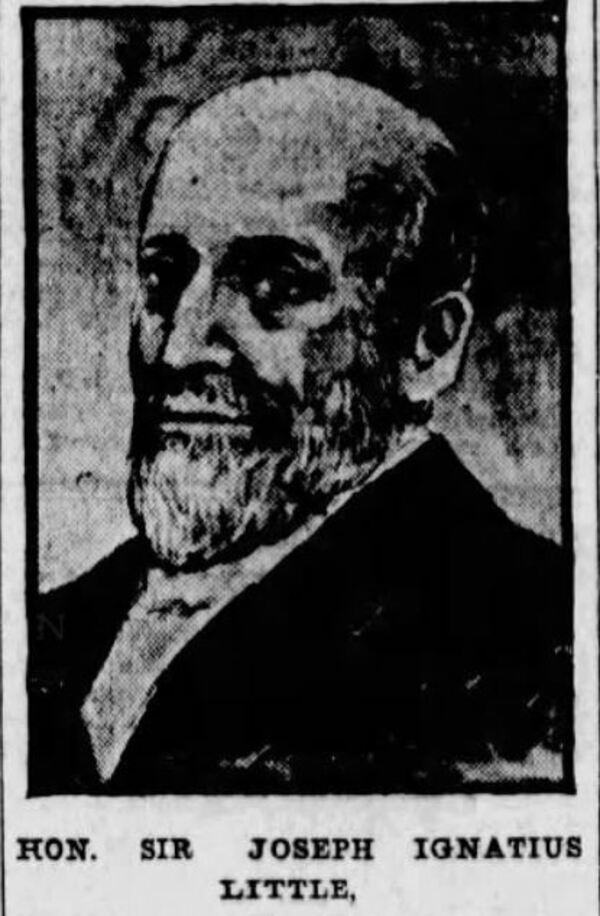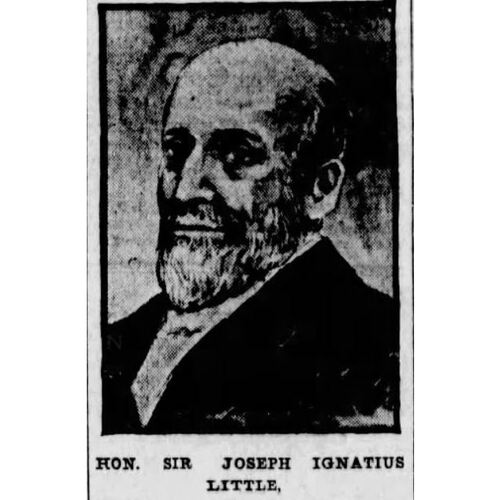
Source: Link
LITTLE, Sir JOSEPH IGNATIUS, lawyer, politician, and judge; b. 1835 in Charlottetown, youngest son of Cornelius Little and Brigid Costin; d. unmarried 14 July 1902 in St John’s.
When Joseph Little emigrated from Prince Edward Island to St John’s in 1851, he went to join two of his elder brothers, who had established a successful law practice there. Philip Francis Little*, indeed, was starting a short but important political career as leader of the Liberal party, and of the campaign for responsible government. Joseph trained for the law and was called to the bar in 1859.
The family law firm disintegrated soon after. Philip Little had become a judge in 1858, and he removed to Ireland ten years later. John, the remaining brother in St John’s, died in 1864. In 1870, therefore, Joseph formed a partnership with Robert John Kent*. He had already followed his brother Philip’s example by entering politics, having been elected a member for Harbour Main in an 1867 by-election. His election strengthened a Liberal opposition hurt by the decision two years earlier of John Kent* and Ambrose and Edward Dalton* Shea to join the pro-confederate government led by Frederic Bowker Terrington Carter*. Little was a vocal anti-confederate, who believed that annexation to the United States was preferable to union with Canada. He played an active role in the campaign against confederation, and was rewarded with the post of attorney general in Charles James Fox Bennett*’s anti-confederate government, which took office in 1870.
His term in the cabinet established Little as leader of the Liberal party, which sat in opposition after the disintegration of Bennett’s government in 1874. It was, however, a party without a cause, since it had achieved all its major objectives. Formed in the 1830s to fight for political reform and for Catholic rights, it had been instrumental in bringing about responsible government, the defeat of confederation, denominational schools, and acceptance of the principle that power and patronage should be shared between denominations. In the 1870s the Liberals found themselves increasingly in sympathy with the generally progressive policies of the Conservatives, and Little proved unwilling or unable to develop a new and distinctive role for his party. The two parties concluded a formal alliance in time for the 1882 general election.
So far as the Liberal leaders were concerned, the rewards were tangible. The law firm of Little and Kent acted for the Newfoundland Railway Company, which began construction in 1881. Kent became speaker, and Little joined Sir William Vallance Whiteway’s Conservative government, without portfolio, in December 1882. The following November Little was appointed to the Supreme Court. On Carter’s retirement in 1898 he became chief justice – on condition, it was rumoured, that he would retire in favour of Sir James Spearman Winter* when the latter stepped down as premier. In the event, this plan was not implemented, and Little died in office four years after his promotion. He had been knighted in 1901.
A devout Roman Catholic bachelor, Little appears to have lived a generally blameless life in the shadow of more important figures on the Newfoundland political stage. He had the political realism, however, to see that the Liberal party which his brother had led had outlived its usefulness. As a result, and perhaps ironically, he played his part in the secularization of Newfoundland public life.
Supreme Court of Newfoundland (St John’s), Registry, probate records for J. I. Little. Daily News (St John’s), 14–15, 24 July 1902. Newfoundlander, 11 Feb. 1868. Patriot and Terra-Nova Herald (St John’s), 9 Dec. 1867. Telegraph (St John’s), 18 Dec. 1867. Times and General Commercial Gazette (St John’s), 23 Nov. 1867. Hiller, “Hist. of Nfld.” J. A. O’Reilly, “Sir Joseph Ignatius Little, late chief justice of Newfoundland,” Nfld Quarterly, 2 (1902–3), no.2: 14–16.
Cite This Article
J. K. Hiller, “LITTLE, Sir JOSEPH IGNATIUS,” in Dictionary of Canadian Biography, vol. 13, University of Toronto/Université Laval, 2003–, accessed February 26, 2026, https://www.biographi.ca/en/bio/little_joseph_ignatius_13E.html.
The citation above shows the format for footnotes and endnotes according to the Chicago manual of style (16th edition). Information to be used in other citation formats:
| Permalink: | https://www.biographi.ca/en/bio/little_joseph_ignatius_13E.html |
| Author of Article: | J. K. Hiller |
| Title of Article: | LITTLE, Sir JOSEPH IGNATIUS |
| Publication Name: | Dictionary of Canadian Biography, vol. 13 |
| Publisher: | University of Toronto/Université Laval |
| Year of publication: | 1994 |
| Year of revision: | 1994 |
| Access Date: | February 26, 2026 |



